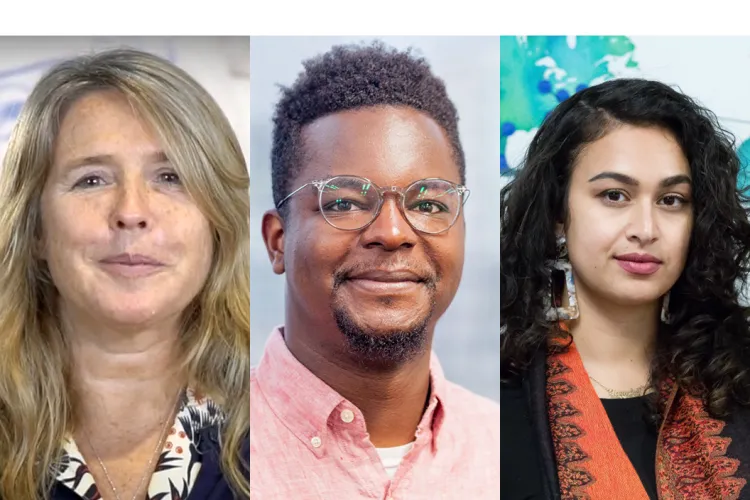Peace & Conflict Studies Program Celebrates 30th Year

Allison Oman Lawi ’91, Maurice Weeks ’09, and Jasmine Rashid ’18 all participated in the online panel.
The Peace & Conflict Studies (PCS) Program recently celebrated its 30th anniversary with a virtual gathering of faculty, students, alumni, and staff. Visiting Assistant Professor Amy Kapit moderated the event, which included a panel discussion of three PCS alumni. Jerry Frost, Howard M. and Charles F. Jenkins Professor Emeritus of History and former PCS program coordinator, opened the celebration by reflecting on the program’s inaugural days.
Professor of Peace & Conflict Studies and current program coordinator Lee Smithey reflected on the growth of the PCS program since he arrived in 2003 and thanked a range of supportive organizations, including Pendle Hill (Quaker Retreat Center), the Friends Historical Library, the Swarthmore College Peace Collection, the Lang Center for Civic and Social Responsibility, the Intercultural Center, the Black Cultural Center, and the Interfaith Center, as well as administrative support staff. Smithey also extended thanks to the students and faculty of the PCS program.
“What’s clear to me is that the story of the Peace & Conflict Studies program over the past 30 years is about the people,” said Smithey. “The program has been built on the goodwill and vision and volunteerism and hard work of students, staff, and faculty, and I’m ever so grateful. It’s great to be here and see all your names on the participants list.”
Kapit introduced the panelists of alumni: Allison Oman Lawi ’91, Maurice Weeks ’09, and Jasmine Rashid ’18.
Lawi, who was recognized for the Nobel Peace Prize in 2020, graduated with a special major in peace studies, combining sociology, anthropology, and religion. As Kapit said, she is “the vanguard of the peace and conflict studies program.” Lawi is now deputy director for the Nutrition Division at the United Nations World Food Programme.
Weeks, who graduated with a major in sociology & anthropology and a minor in peace & conflict studies, is now co-executive director of the Action Center on Race and Economy (ACRE), where he works with community organizations and labor unions on campaigns to create equitable communities by dismantling systems of wealth extraction that target Black and Brown communities. He was one of the first students to participate in the Northern Ireland semester, headed by Denise Crossan, former Lang Professor of Social Change and currently the College’s director of community and strategic initiatives.
Rashid graduated with a major in Peace & Conflict Studies. She is now director of impact for the Candide Group, where she helps direct millions of dollars annually via loans and equity investments to minority women and BIPOC-led social impact companies and funds. All three alumni expressed gratitude for the opportunities Swarthmore has afforded them, both inside and outside of the classroom.
“I remain eternally grateful to Swarthmore as a place where something like peace and conflict studies can happen,” said Lawi. “Here we can develop this idea of, at least for me, what it means to really be a global citizen and have all the rights but, more importantly, the obligations that go with that.”
“I don’t think I would have been able to do any of the organizing that I was able to do without some of the relationships I built at Swarthmore through the Peace & Conflict Studies program,” added Weeks.
Rashid described her work as a student in the Lang Center as foundational to her current work.
“It was really a home base for me,” she said. “My primary role there was really to connect students to opportunities like impact-oriented internships. I found so much joy in being able to advise students and really flow opportunities either locally or internationally and nationally, which I now see as parallel to my day job, where I get to flow capital to people right and think about opportunities in a similar way.”
Kapit closed by asking panelists how they stay motivated in a world full of distressing news.
“I look at my community in Detroit, and I see people winning community gardens or stopping mass evictions — things that might not make it to the first few pages of [The New York Times], but are really based on folks coming together and fighting back and winning,” said Weeks. “It’s the expansion of things that are really going to equal those major system-toppling wins that we’re all building towards. Seeing those things at the ground level are the things that keep me going.”
For Lawi, hearing the stories of the communities she works with is the most motivating.
“What’s always been the thing that’s kept me going has just been the tremendous amount of learning that you do when all the noise stops, and you’re sitting with a community, and you’re listening to their story and their truth,” she said.
“Fundamentally, I feel like we’re doing the same thing, which is just love,” Lawi added. “It really is just this way of recognizing that we’re not so separate, and we’re not so different. We might have different pathways of interacting, but we’re really kind of spreading this love of what needs to happen and what the world needs to be like and what it could be.”



